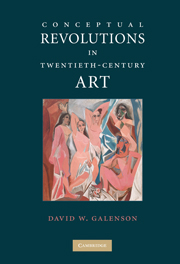Book contents
- Frontmatter
- Contents
- List of Tables
- Preface
- Introduction: And Now for Something Completely Different
- 1 The Back Story of Twentieth-Century Art
- 2 The Greatest Artists of the Twentieth Century
- 3 The Most Important Works of Art of the Twentieth Century
- 4 The Greatest Artistic Breakthroughs of the Twentieth Century
- 5 The Greatest Women Artists of the Twentieth Century
- 6 Creating New Genres: Conceptual Artists at Work and Play in the Twentieth Century
- 7 And Now for Something Completely Different: The Versatility of Conceptual Innovators
- 8 You Cannot Be Serious: The Conceptual Innovator as Trickster
- 9 Painting by Proxy: The Conceptual Artist as Manufacturer
- 10 Co-Authoring Advanced Art
- 11 Language in Visual Art
- 12 Portraits of the Artist: Personal Visual Art in the Twentieth Century
- 13 The Rise and (Partial) Fall of Abstract Painting in the Twentieth Century
- 14 The Globalization of Advanced Art in the Twentieth Century
- 15 Artists and the Market: From Leonardo and Titian to Warhol and Hirst
- 16 The State of Advanced Art: The Late Twentieth Century and Beyond
- Notes
- Bibliography
- Index
8 - You Cannot Be Serious: The Conceptual Innovator as Trickster
Published online by Cambridge University Press: 05 June 2012
- Frontmatter
- Contents
- List of Tables
- Preface
- Introduction: And Now for Something Completely Different
- 1 The Back Story of Twentieth-Century Art
- 2 The Greatest Artists of the Twentieth Century
- 3 The Most Important Works of Art of the Twentieth Century
- 4 The Greatest Artistic Breakthroughs of the Twentieth Century
- 5 The Greatest Women Artists of the Twentieth Century
- 6 Creating New Genres: Conceptual Artists at Work and Play in the Twentieth Century
- 7 And Now for Something Completely Different: The Versatility of Conceptual Innovators
- 8 You Cannot Be Serious: The Conceptual Innovator as Trickster
- 9 Painting by Proxy: The Conceptual Artist as Manufacturer
- 10 Co-Authoring Advanced Art
- 11 Language in Visual Art
- 12 Portraits of the Artist: Personal Visual Art in the Twentieth Century
- 13 The Rise and (Partial) Fall of Abstract Painting in the Twentieth Century
- 14 The Globalization of Advanced Art in the Twentieth Century
- 15 Artists and the Market: From Leonardo and Titian to Warhol and Hirst
- 16 The State of Advanced Art: The Late Twentieth Century and Beyond
- Notes
- Bibliography
- Index
Summary
The Accusation
The artist does not say today, “Come and see faultless work,” but “Come and see sincere work.”
Edouard Manet, 1867When Edouard Manet exhibited Le Déjeuner sur l'herbe at the Salon des Refusés in 1863, the critic Louis Etienne described the painting as an “unbecoming rebus,” and denounced it as “a young man's practical joke, a shameful open sore not worth exhibiting this way.” Two years later, when Manet's Olympia was shown at the Salon, the critic Félix Jahyer wrote that the painting was indecent, and declared that “I cannot take this painter's intentions seriously.” The critic Ernest Fillonneau claimed this reaction was a common one, for “an epidemic of crazy laughter prevails…in front of the canvases by Manet.” Another critic, Jules Clarétie, described Manet's two paintings at the Salon as “challenges hurled at the public, mockeries or parodies, how can one tell?” In his review of the Salon, the critic Théophile Gautier concluded his condemnation of Manet's paintings by remarking that “Here there is nothing, we are sorry to say, but the desire to attract attention at any price.”
The most decisive rejection of these charges against Manet was made in a series of articles published in 1866–67 by the young critic and writer Emile Zola. Zola began by declaring that those who laughed at Manet were fools: “There isn't the least thing laughable in all this. There is only a sincere artist following his own bent.”
- Type
- Chapter
- Information
- Conceptual Revolutions in Twentieth-Century Art , pp. 159 - 183Publisher: Cambridge University PressPrint publication year: 2009



